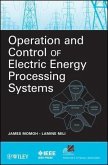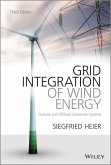Handbook of Electrical Power System Dynamics (eBook, ePUB)
Modeling, Stability, and Control
Redaktion: Eremia, Mircea; Shahidehpour, Mohammad


Alle Infos zum eBook verschenken

Handbook of Electrical Power System Dynamics (eBook, ePUB)
Modeling, Stability, and Control
Redaktion: Eremia, Mircea; Shahidehpour, Mohammad
- Format: ePub
- Merkliste
- Auf die Merkliste
- Bewerten Bewerten
- Teilen
- Produkt teilen
- Produkterinnerung
- Produkterinnerung

Hier können Sie sich einloggen

Bitte loggen Sie sich zunächst in Ihr Kundenkonto ein oder registrieren Sie sich bei bücher.de, um das eBook-Abo tolino select nutzen zu können.
This book aims to provide insights on new trends in power systems operation and control and to present, in detail, analysis methods of the power system behavior (mainly its dynamics) as well as the mathematical models for the main components of power plants and the control systems implemented in dispatch centers. Particularly, evaluation methods for rotor angle stability and voltage stability as well as control mechanism of the frequency and voltage are described. Illustrative examples and graphical representations help readers across many disciplines acquire ample knowledge on the respective subjects.…mehr
- Geräte: eReader
- ohne Kopierschutz
- eBook Hilfe
![Switching in Electrical Transmission and Distribution Systems (eBook, ePUB) Switching in Electrical Transmission and Distribution Systems (eBook, ePUB)]() René SmeetsSwitching in Electrical Transmission and Distribution Systems (eBook, ePUB)104,99 €
René SmeetsSwitching in Electrical Transmission and Distribution Systems (eBook, ePUB)104,99 €![Advanced Electric Drives (eBook, ePUB) Advanced Electric Drives (eBook, ePUB)]() Ned MohanAdvanced Electric Drives (eBook, ePUB)116,99 €
Ned MohanAdvanced Electric Drives (eBook, ePUB)116,99 €![Operation and Control of Electric Energy Processing Systems (eBook, ePUB) Operation and Control of Electric Energy Processing Systems (eBook, ePUB)]() Operation and Control of Electric Energy Processing Systems (eBook, ePUB)89,99 €
Operation and Control of Electric Energy Processing Systems (eBook, ePUB)89,99 €![Handbook of Power Systems Engineering with Power Electronics Applications (eBook, ePUB) Handbook of Power Systems Engineering with Power Electronics Applications (eBook, ePUB)]() Yoshihide HaseHandbook of Power Systems Engineering with Power Electronics Applications (eBook, ePUB)123,99 €
Yoshihide HaseHandbook of Power Systems Engineering with Power Electronics Applications (eBook, ePUB)123,99 €![Grid Integration of Wind Energy (eBook, ePUB) Grid Integration of Wind Energy (eBook, ePUB)]() Siegfried HeierGrid Integration of Wind Energy (eBook, ePUB)94,99 €
Siegfried HeierGrid Integration of Wind Energy (eBook, ePUB)94,99 €![Design of Rotating Electrical Machines (eBook, ePUB) Design of Rotating Electrical Machines (eBook, ePUB)]() Juha PyrhonenDesign of Rotating Electrical Machines (eBook, ePUB)115,99 €
Juha PyrhonenDesign of Rotating Electrical Machines (eBook, ePUB)115,99 €![The Principles of Electronic and Electromechanic Power Conversion (eBook, ePUB) The Principles of Electronic and Electromechanic Power Conversion (eBook, ePUB)]() Braham FerreiraThe Principles of Electronic and Electromechanic Power Conversion (eBook, ePUB)91,99 €
Braham FerreiraThe Principles of Electronic and Electromechanic Power Conversion (eBook, ePUB)91,99 €-
-
-
Dieser Download kann aus rechtlichen Gründen nur mit Rechnungsadresse in D ausgeliefert werden.
- Produktdetails
- Verlag: Wiley-IEEE Press
- Erscheinungstermin: 21. Februar 2013
- Englisch
- ISBN-13: 9781118516065
- Artikelnr.: 37757972
- Verlag: Wiley-IEEE Press
- Erscheinungstermin: 21. Februar 2013
- Englisch
- ISBN-13: 9781118516065
- Artikelnr.: 37757972
- Herstellerkennzeichnung Die Herstellerinformationen sind derzeit nicht verfügbar.
Acknowledgments xxv
Contributors xxvii
1. INTRODUCTION 1
Mircea Eremia and Mohammad Shahidehpour
PART I POWER SYSTEM MODELING AND CONTROL 7
2. SYNCHRONOUS GENERATOR AND INDUCTION MOTOR 9
Mircea Eremia and Constantin Bulac
2.1. Theory and Modeling of Synchronous Generator 9
2.2. Theory and Modeling of the Induction Motor 114
3. MODELING THE MAIN COMPONENTS OF THE CLASSICAL POWER PLANTS 137
Mohammad Shahidehpour, Mircea Eremia, and Lucian Toma
3.1. Introduction 137
3.2. Types of Turbines 138
3.3. Thermal Power Plants 143
3.4. Combined-Cycle Power Plants 158
3.5. Nuclear Power Plants 167
3.6. Hydraulic Power Plants 169
4. WIND POWER GENERATION 179
Mohammad Shahidehpour and Mircea Eremia
4.1. Introduction 179
4.2. Some Characteristics of Wind Power Generation 181
4.3. State of the Art Technologies 184
4.4. Modeling the Wind Turbine Generators 200
4.5. Fault Ride-Through Capability 223
5. SHORT-CIRCUIT CURRENTS CALCULATION 229
Nouredine Hadjsaid, Ion TriSstiu, and Lucian Toma
5.1. Introduction 229
5.2. Characteristics of Short-Circuit Currents 232
5.3. Methods of Short-Circuit Currents Calculation 236
5.4. Calculation of Short-Circuit Current Components 264
6. ACTIVE POWER AND FREQUENCY CONTROL 291
Les Pereira
6.1. Introduction 291
6.2. Frequency Deviations in Practice 293
6.3. Typical Standards and Policies for "Active Power and Frequency
Control" or "Load Frequency Control" 294
6.4. System Modeling, Inertia, Droop, Regulation, and Dynamic Frequency
Response 297
6.5. Governor Modeling 302
6.6. AGC Principles and Modeling 328
6.7. Other Topics of Interest Related to Load Frequency Control 336
7. VOLTAGE AND REACTIVE POWER CONTROL 340
Sandro Corsi and Mircea Eremia
7.1. Relationship Between Active and Reactive Powers and Voltage 342
7.2. Equipments for Voltage and Reactive Power Control 347
7.3. Grid Voltage and Reactive Power Control Methods 374
7.4. Grid Hierarchical Voltage Regulation 399
7.5. Implementation Study of the Secondary Voltage Regulation in Romania
423
7.6. Examples of Hierarchical Voltage Control in the World 429
PART II POWER SYSTEM STABILITY AND PROTECTION 451
8. BACKGROUND OF POWER SYSTEM STABILITY 453
S.S. (Mani) Venkata, Mircea Eremia, and Lucian Toma
8.1. Introduction 453
8.2. Classification of Power Systems Stability 453
8.3. Parallelism Between Voltage Stability and Angular Stability 469
8.4. Importance of Security for Power System Stability 469
9. SMALL-DISTURBANCE ANGLE STABILITY AND ELECTROMECHANICAL OSCILLATION
DAMPING 477
Roberto Marconato and Alberto Berizzi
9.1. Introduction 477
9.2. The Dynamic Matrix 478
9.3. A General Simplified Approach 482
9.4. Major Factors Affecting the Damping of Electromechanical Oscillations
501
9.5. Damping Improvement 546
9.6. Typical Cases of Interarea Or Low-Frequency Electromechanical
Oscillations 564
10. TRANSIENT STABILITY 570
Nikolai Voropai and Constantin Bulac
10.1. General Aspects 570
10.2. Direct Methods for Transient Stability Assessment 572
10.3. Integration Methods for Transient Stability Assessment 603
10.4. Dynamic Equivalents 614
10.5. Transient Stability Assessment of Large Electric Power Systems 638
10.6. Application 645
11. VOLTAGE STABILITY 657
Mircea Eremia and Constantin Bulac
11.1. Introduction 657
11.2. System Characteristics and Load Modeling 658
11.3. Static Aspects of Voltage Stability 667
11.4. Voltage Instability Mechanisms: Interaction Between Electrical
Network, Loads, and Control Devices 674
11.5. Voltage Stability Assessment Methods 688
11.6. Voltage Instability Countermeasures 716
11.7. Application 724
12. POWER SYSTEM PROTECTION 737
Klaus-Peter Brand and Ivan De Mesmaeker
12.1. Introduction 737
12.2. Summary of IEC 61850 744
12.3. The Protection Chain in Details 746
12.4. Transmission and Distribution Power System Structures 753
12.5. Properties of the Three-Phase Systems Relevant for Protection 755
12.6. Protection Functions Sorted According to the Objects Protected 759
12.7. From Single Protection Functions to System Protection 773
12.8. Conclusions 780
PART III GRID BLACKOUTS AND RESTORATION PROCESS 787
13. MAJOR GRID BLACKOUTS: ANALYSIS, CLASSIFICATION, AND PREVENTION 789
Yvon Besanger, Mircea Eremia, and Nikolai Voropai
13.1. Introduction 789
13.2. Description of Some Previous Blackouts 792
13.3. Analysis of Blackouts 835
13.4. Economical and Social Effects 847
13.5. Recommendations for Preventing Blackouts 849
13.6. On Some Defense and Restoration Actions 850
13.7. Survivability/vulnerability of Electric Power Systems 856
13.8. Conclusions 860
14. RESTORATION PROCESSES AFTER BLACKOUTS 864
Alberto Borghetti, Carlo Alberto Nucci, and Mario Paolone
14.1. Introduction 864
14.2. Overview of The Restoration Process 865
14.3. Black-Start-Up Capabilities of Thermal Power Plant: Modeling and
Computer Simulations 869
14.4. Description of Computer Simulators 888
14.5. Concluding Remarks 896
15. COMPUTER SIMULATION OF SCALE-BRIDGING TRANSIENTS IN POWER SYSTEMS 900
Kai Strunz and Feng Gao
15.1. Bridging of Instantaneous and Phasor Signals 901
15.2. Network Modeling 903
15.3. Modeling of Power System Components 909
15.4. Application: Simulation of Blackout 923
References 926
Index 929
Acknowledgments xxv
Contributors xxvii
1. INTRODUCTION 1
Mircea Eremia and Mohammad Shahidehpour
PART I POWER SYSTEM MODELING AND CONTROL 7
2. SYNCHRONOUS GENERATOR AND INDUCTION MOTOR 9
Mircea Eremia and Constantin Bulac
2.1. Theory and Modeling of Synchronous Generator 9
2.2. Theory and Modeling of the Induction Motor 114
3. MODELING THE MAIN COMPONENTS OF THE CLASSICAL POWER PLANTS 137
Mohammad Shahidehpour, Mircea Eremia, and Lucian Toma
3.1. Introduction 137
3.2. Types of Turbines 138
3.3. Thermal Power Plants 143
3.4. Combined-Cycle Power Plants 158
3.5. Nuclear Power Plants 167
3.6. Hydraulic Power Plants 169
4. WIND POWER GENERATION 179
Mohammad Shahidehpour and Mircea Eremia
4.1. Introduction 179
4.2. Some Characteristics of Wind Power Generation 181
4.3. State of the Art Technologies 184
4.4. Modeling the Wind Turbine Generators 200
4.5. Fault Ride-Through Capability 223
5. SHORT-CIRCUIT CURRENTS CALCULATION 229
Nouredine Hadjsaid, Ion TriSstiu, and Lucian Toma
5.1. Introduction 229
5.2. Characteristics of Short-Circuit Currents 232
5.3. Methods of Short-Circuit Currents Calculation 236
5.4. Calculation of Short-Circuit Current Components 264
6. ACTIVE POWER AND FREQUENCY CONTROL 291
Les Pereira
6.1. Introduction 291
6.2. Frequency Deviations in Practice 293
6.3. Typical Standards and Policies for "Active Power and Frequency
Control" or "Load Frequency Control" 294
6.4. System Modeling, Inertia, Droop, Regulation, and Dynamic Frequency
Response 297
6.5. Governor Modeling 302
6.6. AGC Principles and Modeling 328
6.7. Other Topics of Interest Related to Load Frequency Control 336
7. VOLTAGE AND REACTIVE POWER CONTROL 340
Sandro Corsi and Mircea Eremia
7.1. Relationship Between Active and Reactive Powers and Voltage 342
7.2. Equipments for Voltage and Reactive Power Control 347
7.3. Grid Voltage and Reactive Power Control Methods 374
7.4. Grid Hierarchical Voltage Regulation 399
7.5. Implementation Study of the Secondary Voltage Regulation in Romania
423
7.6. Examples of Hierarchical Voltage Control in the World 429
PART II POWER SYSTEM STABILITY AND PROTECTION 451
8. BACKGROUND OF POWER SYSTEM STABILITY 453
S.S. (Mani) Venkata, Mircea Eremia, and Lucian Toma
8.1. Introduction 453
8.2. Classification of Power Systems Stability 453
8.3. Parallelism Between Voltage Stability and Angular Stability 469
8.4. Importance of Security for Power System Stability 469
9. SMALL-DISTURBANCE ANGLE STABILITY AND ELECTROMECHANICAL OSCILLATION
DAMPING 477
Roberto Marconato and Alberto Berizzi
9.1. Introduction 477
9.2. The Dynamic Matrix 478
9.3. A General Simplified Approach 482
9.4. Major Factors Affecting the Damping of Electromechanical Oscillations
501
9.5. Damping Improvement 546
9.6. Typical Cases of Interarea Or Low-Frequency Electromechanical
Oscillations 564
10. TRANSIENT STABILITY 570
Nikolai Voropai and Constantin Bulac
10.1. General Aspects 570
10.2. Direct Methods for Transient Stability Assessment 572
10.3. Integration Methods for Transient Stability Assessment 603
10.4. Dynamic Equivalents 614
10.5. Transient Stability Assessment of Large Electric Power Systems 638
10.6. Application 645
11. VOLTAGE STABILITY 657
Mircea Eremia and Constantin Bulac
11.1. Introduction 657
11.2. System Characteristics and Load Modeling 658
11.3. Static Aspects of Voltage Stability 667
11.4. Voltage Instability Mechanisms: Interaction Between Electrical
Network, Loads, and Control Devices 674
11.5. Voltage Stability Assessment Methods 688
11.6. Voltage Instability Countermeasures 716
11.7. Application 724
12. POWER SYSTEM PROTECTION 737
Klaus-Peter Brand and Ivan De Mesmaeker
12.1. Introduction 737
12.2. Summary of IEC 61850 744
12.3. The Protection Chain in Details 746
12.4. Transmission and Distribution Power System Structures 753
12.5. Properties of the Three-Phase Systems Relevant for Protection 755
12.6. Protection Functions Sorted According to the Objects Protected 759
12.7. From Single Protection Functions to System Protection 773
12.8. Conclusions 780
PART III GRID BLACKOUTS AND RESTORATION PROCESS 787
13. MAJOR GRID BLACKOUTS: ANALYSIS, CLASSIFICATION, AND PREVENTION 789
Yvon Besanger, Mircea Eremia, and Nikolai Voropai
13.1. Introduction 789
13.2. Description of Some Previous Blackouts 792
13.3. Analysis of Blackouts 835
13.4. Economical and Social Effects 847
13.5. Recommendations for Preventing Blackouts 849
13.6. On Some Defense and Restoration Actions 850
13.7. Survivability/vulnerability of Electric Power Systems 856
13.8. Conclusions 860
14. RESTORATION PROCESSES AFTER BLACKOUTS 864
Alberto Borghetti, Carlo Alberto Nucci, and Mario Paolone
14.1. Introduction 864
14.2. Overview of The Restoration Process 865
14.3. Black-Start-Up Capabilities of Thermal Power Plant: Modeling and
Computer Simulations 869
14.4. Description of Computer Simulators 888
14.5. Concluding Remarks 896
15. COMPUTER SIMULATION OF SCALE-BRIDGING TRANSIENTS IN POWER SYSTEMS 900
Kai Strunz and Feng Gao
15.1. Bridging of Instantaneous and Phasor Signals 901
15.2. Network Modeling 903
15.3. Modeling of Power System Components 909
15.4. Application: Simulation of Blackout 923
References 926
Index 929







